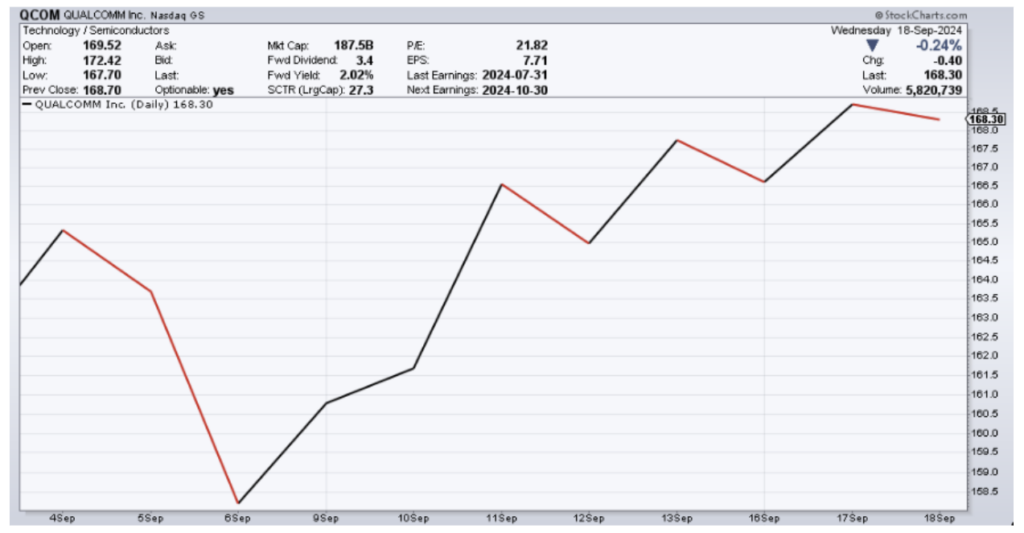As traders, we’re always on the hunt for new opportunities, whether that is trading different strategies on our go-to income stocks or uncovering new names to trade. In our hunt for income, we use numerous tools to boost our odds of success. But, to paraphrase The Beatles (or Joe Cocker for the 80s and 90s kids who grew up watching “The Wonder Years”), it never hurts to have a little help from your friends.
During the Q&A portion of the Sept. 4 Income Masters Live Trading Session, a member (Brad) asked whether Qualcomm (QCOM) ever showed up in the scans for Income Masters trades. He noted that the stock had high implied volatility (IV) and nice premiums. What’s more, QCOM was going ex-dividend the next day with an $0.85 per-share payout.
We went out to the screens to analyze the trade, first looking at a bull put spread opportunity. But there simply wasn’t enough premium there.
We then looked at some buy-writes, which would allow traders to capture the quarterly dividend provided they entered the trade before market close on Sept. 5.
We explored some different strikes and expirations and came across an opportunity that was too good to pass up. So, we put it on as a bonus trade. (Thank you, Brad!)
With the stock trading at $167.13, we purchased 100 shares at market and sold the QCOM 20 Sep 167.50 Call. The premium for the call was a hefty $5.22, bringing our cost basis down to $161.91. The reason the premium was so high was that, with the call so close to the money, there was a very good chance our shares would be called away before the end of the day by someone who wanted to own QCOM to collect the dividend.
If that happened, we still stood to make $5.59, or $559 per 100 shares, for a 3.5% return on our capital in a matter of hours. A great trade by all accounts! If we didn’t happen to get called out, though, we’d earn the $0.85 dividend, adding to our overall cash in the trade.
QCOM closed its ex-dividend date trading at $163.70 and we were not called out of shares. Therefore, we earned the dividend, which was good for an annual yield of about 2%. That’s not eye-popping, but it’s not bad for a tech-leaning company (Qualcomm designs and manufactures wireless technology products and components for many industries).
Plus, there was still a chance we would get called out of our shares if QCOM moved higher by expiration. And, if not, we could sell another covered call.
But QCOM did move higher, running up with the broader market as the much-anticipated Federal Reserve rate-cut announcement approached on Wednesday afternoon.

While everyone expected the central bank to lower the Fed funds rate for the first time since 2020 in an effort to stave off a potential recession, expectations about the size of the cut were mixed. When the Fed announced a 50-basis-point reduction, stocks initially rallied before reversing lower into the close.
But not before we had a chance to exit our QCOM position.
Shortly after the Fed announcement, we sent an alert to close the position rather than holding to expiration.
With QCOM trading at $171.85, we bought back our in-the-money call for $5.05 and sold our shares at market. This resulted in a profit of $4.89 per share ($171.85 share price less the $5.05 cost to close call minus $161.91 cost basis).
When you factor in the $0.85 per-share dividend we earned (payable Sept. 26), that brought our total profit on the trade to $5.74, or $574 per 100 shares, for a 3.5% return over our cost basis. Not too shabby for a trade open just two weeks!
Qualcomm is a great example of what we call a Perpetual Income stock. These are stocks we sell options on while attempting to collect quarterly dividends. However, it’s often the case, as we illustrated above, that even if we miss out on a dividend the combination of premium and capital appreciation more than make up for it.
While QCOM was a shorter-term trade fueled by a member request, Perpetual Income trades are often longer-term plays where we look to continually generate income over the course of weeks or even months.
We are trading a handful of stocks this way in Income Masters, after making the former Perpetual Income service part of the Income Masters program earlier this year. These include alternative asset manager Blackstone (BX), basic materials stock CF Industries (CF), data storage and services provider NetApp (NTAP) and utility stock Southern Co. (SO).
We’ve built up large cash positions in these stocks, which are all names we don’t mind holding longer term.
We also recently closed another shorter-term Perpetual Income-style trade in data storage company Iron Mountain (IRM), which we plan to review next week.
If you’re looking for a way to boost your income, you may want to consider selling options on dividend stocks like these.


